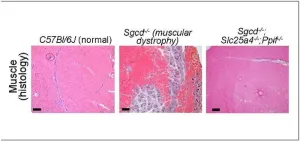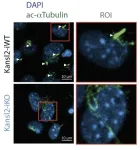(Press-News.org) BIRMINGHAM, Ala. – In 2012, University of Alabama at Birmingham researcher Anath Shalev, M.D., reported that a decades-old blood pressure medication called verapamil completely reversed diabetes in animal models. In 2018, the team had translated these findings into a randomized, controlled, clinical trial, demonstrating significantly improved beta cell function for one year in human subjects with recent onset Type 1 diabetes. By last year, in a small follow-up study, Shalev and colleagues had found that adult Type 1 diabetes patients taking oral verapamil required less daily insulin and showed evidence of beneficial immune modulation for as long as two years after first diagnosis.
Now UAB researchers, led by Guanlan Xu, Ph.D., and Shalev drilled down further into the mechanism underlying verapamil’s beneficial effect. In a paper published in Diabetes, they show that, in Type 1 diabetes patients, verapamil prevented the decline of the hormone insulin-like growth factor 1, or IGF-1, as compared to controls who did not take verapamil. They also found that verapamil promotes IGF-1 signaling in pancreatic beta cells.
Type 1 diabetes is an autoimmune disease that causes loss of the pancreatic beta cells that produce insulin. To replace that insulin — the hormone that helps control blood sugar — patients must take exogenous insulin by shots or a pump and are at risk of dangerous low blood sugar events. There is no current oral treatment for this disease.
Besides Shalev’s adult study, a recent independent study of children with Type 1 diabetes has also confirmed that verapamil preserves beta cell function, compared with children not taking verapamil.
In the Diabetes study, Xu, Shalev and colleagues did a global proteomics study analysis of serum samples from Shalev’s adult study both at baseline and at one year of receiving verapamil or a placebo. They found 59 proteins showed significant changes in abundance over time, and one of the top five differentially changed proteins was IGF-1. The placebo group showed a significant decline of IGF-1 from baseline to one year, but that decline was blunted in the verapamil group.
Others have found that serum IGF-1 correlates with residual beta cell function, a correlation the UAB researchers also found for the verapamil group, as measured by retention of the ability to produce endogenous insulin by the beta cells that are located in pancreatic islets.
RNA sequencing of samples of human pancreatic islets treated with or without verapamil showed that the expression of four IGF binding proteins was significantly decreased by verapamil. Such a decrease in proteins that bind to IGF-1 should allow IGF-1 to interact with its IGF-1 receptor. Binding of IGF-1 to the receptor initiates the IGF-1 signaling pathway that alters gene expression inside the beta cell. As a measure of increased signaling, the researchers indeed found that verapamil did activate the IGF-1 receptor and its downstream effector, AKT, as measured by increased phosphorylation of both.
In contrast, in human islets that were treated with Type 1 diabetes-associated inflammatory cytokines, as well as islets from a mouse model of Type 1 diabetes, researchers found significantly increased expression of IGF binding protein 3, which is the most abundant of the IGF binding protein family. These results suggest that islet expression of IGF binding proteins is upregulated under Type 1 diabetes conditions.
The Shalev team previously has shown increased beta-cell expression of TXNIP — a protein that promotes programmed cell death and dysfunction of beta cells — during diabetes. The team has also showed that verapamil inhibits beta-cell expression of TXNIP, resulting in the beneficial anti-diabetic effects. In the current study, the researchers now have shown that overexpression of human TXNIP significantly increased expression of IGF binding protein 3, while TXNIP-deficient islets had decreased expression of IGF binding protein 3. Furthermore, overexpression of TXNIP significantly decreased the phosphorylation activation of the IGF-1 receptor.
“Thus, our results reveal IGF-1 signaling as yet another previously unappreciated pathway affected by verapamil and TXNIP that may contribute to the beneficial verapamil effects in the context of Type 1 diabetes,” Shalev said.
At UAB, Shalev is director of the UAB Comprehensive Diabetes Center and a professor in the Department of Medicine Division of Endocrinology, Diabetes and Metabolism. Xu is an instructor in the Department of Medicine Division of Endocrinology, Diabetes and Metabolism and a scientist in the UAB Comprehensive Diabetes Center.
Co-authors with Xu and Shalev in the study, “Verapamil prevents decline of IGF-1 in subjects with T1D and promotes beta-cell IGF-1 signaling,” are Junqin Chen and Brian Lu, UAB Department of Medicine, Division of Endocrinology, Diabetes and Metabolism; Praveen Sethupathy, Cornell University, Ithaca, New York; and Wei-Jun Qian, Pacific Northwest National Laboratory, Richland, Washington.
Support came from National Institutes of Health grants DK078752 and DK122160, and from a UAB Diabetes Research Center Pilot and Feasibility Award. Human pancreatic islets were provided by the National Institute of Diabetes and Digestive and Kidney Diseases-funded Integrated Islet Distribution Program at City of Hope, Duarte, California.
At UAB, Shalev holds the Nancy R. and Eugene C. Gwaltney Family Endowed Chair in Juvenile Diabetes Research. Medicine is a department in the Marnix E. Heersink School of Medicine.
END
In Type 1 diabetes, verapamil prevents decline of IGF-1 and promotes beta-cell IGF-1 signaling
These results add an additional, mechanistic aspect to further explain how the decades-old blood pressure medication verapamil can preserve beta cell function in Type 1 diabetes patients by affecting the hormone insulin-like growth factor 1.
2023-08-25
ELSE PRESS RELEASES FROM THIS DATE:
How being in space impairs astronauts’ immune system
2023-08-25
A new study led by researchers at Karolinska Institutet in Sweden has examined how T cells of the immune system are affected by weightlessness. The results, which are published in the journal Science Advances, could explain why astronauts’ T cells become less active and less effective at fighting infection.
The next steps in the exploration of space are human missions to the moon and to Mars. Space is an extremely hostile environment that poses threats to human health. One such threat is changes to the immune system that occur in astronauts while in space and ...
Mitochondria pore emerges as potential key to managing muscular dystrophies
2023-08-25
Ever since the Jerry Lewis telethons began in the 1960s, millions of people have become familiar with an otherwise rare disease called muscular dystrophy (MD).
The medical world has learned much over the ensuing years, including that more than 30 closely related disorders exist that can produce the gradual muscle degeneration that steals a child’s ability to walk and eventually disrupts other organ functions. An estimated 250,000 people in the U.S. are living with a muscular dystrophy. While many are living longer lives thanks to improved treatments, no cure has been found.
Now an eye-opening study ...
Unlocking the secrets of cell antennas
2023-08-25
Cilia are thin, eyelash-like extensions on the surface of cells. They perform a wide variety of functions, acting as mechanosensors or chemosensors, and play a crucial role in many signaling pathways. In the last few decades, the organelle has undergone a remarkable, but at the same time sinister, career transformation. It evolved from an organelle whose relevance was unclear to becoming a central player in the pathogenesis of a large group of diseases. These so-called ciliopathies are associated with a wide range of symptoms, including hearing loss, visual impairment, obesity, kidney disease, and mental disability. Different gene mutations impair cilia formation, ...
How origami might inform disease diagnoses
2023-08-25
Researchers at the USC Viterbi School of Engineering looked to origami to create new sensors that could someday be employed to detect deformations in organs and also for use in wearables and soft robotics.
Their paper, “High-Stretchability and Low-Hysteresis Strain Sensors Using Origami-Inspired 3D Mesostructures,” featured in Science Advances explains how USC researchers Hangbo Zhao, Xinghao Huang, Liangshu Liu, Yung Hsin Lin, Rui Feng, Yiyang Shen, and Yuanning Chang developed “stretchable strain sensors,” ...
Weight loss medication benefits patients with heart failure and obesity
2023-08-25
Amsterdam, Netherlands – 25 Aug 2023: Semaglutide improves heart failure-related symptoms and physical function and results in greater weight loss compared with placebo in patients with heart failure with preserved ejection fraction (HFpEF) and obesity, according to late breaking research presented in a Hot Line session today at ESC Congress 2023.1
Approximately half of patients with heart failure in the community have HFpEF.2 Most patients with HFpEF are overweight or obese, and growing evidence suggests that obesity and excess adiposity are not simply comorbidities, ...
Oral anticoagulation is not effective in patients with atrial high-rate episodes
2023-08-25
Amsterdam, Netherlands – 25 Aug 2023: Blood thinners (anticoagulants) cause bleeding without preventing stroke in patients with atrial high rate episodes (AHRE), but without electrocardiogram (ECG)-diagnosed atrial fibrillation, according to late breaking research presented in a Hot Line session today at ESC Congress 2023 and simultaneously published in the New England Journal of Medicine.1
Anticoagulants prevent strokes in patients with atrial fibrillation but are not effective in those without atrial fibrillation, for example in patients with ...
Colchicine fails to reduce primary outcomes in COP-AF trial but encouraging signals found
2023-08-25
Amsterdam, Netherlands – 25 Aug 2023: Colchicine does not significantly reduce perioperative atrial fibrillation (AF) or myocardial injury after non-cardiac surgery (MINS) in patients undergoing major non-cardiac thoracic surgery, according to late breaking research presented in a Hot Line session today at ESC Congress 2023.1
Perioperative AF occurs in approximately 10% of patients after major thoracic surgery, while MINS has an incidence of about 20% in the same patient population.2 Patients with perioperative AF and MINS have a poor prognosis.3,4 High levels ...
First ESC Guidelines covering all acute coronary syndromes published today
2023-08-25
Amsterdam, Netherlands – 25 Aug 2023: The European Society of Cardiology (ESC) Guidelines on acute coronary syndromes are published online today in European Heart Journal.1 The document covers the management of unstable angina and all types of acute myocardial infarction.
“Time is critical in acute coronary syndromes. When an artery supplying the heart with blood becomes blocked, the quicker we open the artery and restore flow, the less damage occurs to the heart muscle,” said Guidelines task force ...
First international guidelines on heart muscle diseases published today
2023-08-25
Amsterdam, Netherlands – 25 Aug 2023: The European Society of Cardiology (ESC) Guidelines on cardiomyopathies are published online today in European Heart Journal.1 This is the first international guideline document to include all cardiomyopathy subtypes, and the first time that specific recommendations are made for cardiomyopathies other than hypertrophic cardiomyopathy.
“This pioneering document reflects the advances in genetics and cardiac imaging and the advent of new treatments that target specific causes of disease,” said Guidelines task force chairperson Dr. Elena Arbelo of the Hospital Clinic, University of Barcelona, Spain.
“At the ...
Recommendations to reduce cardiovascular risk in patients with diabetes published today
2023-08-25
Amsterdam, Netherlands – 25 Aug 2023: Patients with type 2 diabetes are more than twice as likely to develop cardiovascular disease (CVD) than their healthy peers. Advice to lower that risk is launched today in the 2023 European Society of Cardiology (ESC) Guidelines for the management of cardiovascular disease in patients with diabetes, published in European Heart Journal.1
“Patients with type 2 diabetes have a two- to four-fold higher risk of coronary artery disease, stroke, heart failure, atrial fibrillation and peripheral artery disease compared to those without type 2 diabetes and when CVD occurs, the prognosis ...
LAST 30 PRESS RELEASES:
Novel camel antimicrobial peptides show promise against drug-resistant bacteria
Scientists discover why we know when to stop scratching an itch
A hidden reason inner ear cells die – and what it means for preventing hearing loss
Researchers discover how tuberculosis bacteria use a “stealth” mechanism to evade the immune system
New microscopy technique lets scientists see cells in unprecedented detail and color
Sometimes less is more: Scientists rethink how to pack medicine into tiny delivery capsules
Scientists build low-cost microscope to study living cells in zero gravity
The Biophysical Journal names Denis V. Titov the 2025 Paper of the Year-Early Career Investigator awardee
Scientists show how your body senses cold—and why menthol feels cool
Scientists deliver new molecule for getting DNA into cells
Study reveals insights about brain regions linked to OCD, informing potential treatments
Does ocean saltiness influence El Niño?
2026 Young Investigators: ONR celebrates new talent tackling warfighter challenges
Genetics help explain who gets the ‘telltale tingle’ from music, art and literature
Many Americans misunderstand medical aid in dying laws
Researchers publish landmark infectious disease study in ‘Science’
New NSF award supports innovative role-playing game approach to strengthening research security in academia
Kumar named to ACMA Emerging Leaders Program for 2026
AI language models could transform aquatic environmental risk assessment
New isotope tools reveal hidden pathways reshaping the global nitrogen cycle
Study reveals how antibiotic structure controls removal from water using biochar
Why chronic pain lasts longer in women: Immune cells offer clues
Toxic exposure creates epigenetic disease risk over 20 generations
More time spent on social media linked to steroid use intentions among boys and men
New study suggests a “kick it while it’s down” approach to cancer treatment could improve cure rates
Milken Institute, Ann Theodore Foundation launch new grant to support clinical trial for potential sarcoidosis treatment
New strategies boost effectiveness of CAR-NK therapy against cancer
Study: Adolescent cannabis use linked to doubling risk of psychotic and bipolar disorders
Invisible harms: drug-related deaths spike after hurricanes and tropical storms
Adolescent cannabis use and risk of psychotic, bipolar, depressive, and anxiety disorders
[Press-News.org] In Type 1 diabetes, verapamil prevents decline of IGF-1 and promotes beta-cell IGF-1 signalingThese results add an additional, mechanistic aspect to further explain how the decades-old blood pressure medication verapamil can preserve beta cell function in Type 1 diabetes patients by affecting the hormone insulin-like growth factor 1.



